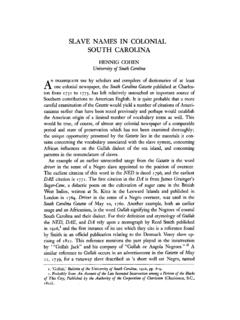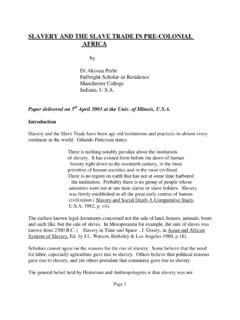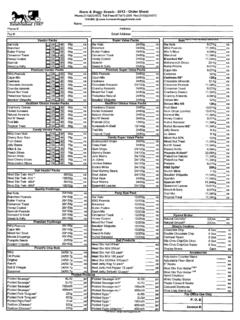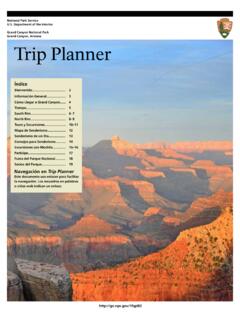Transcription of Discovering the Chichimecas - Latin American Studies
1 The Americas 51:1 July 1994, 67-88 Copyright by the Academy of American Franciscan History Discovering THE Chichimecas he European practice of conceptualizing their enemies so that they could dispose of them in ways that were not in accord with their own Christian principles is well documented. In the Americas, this began with Columbus's designation of certain Indians as man-eaters and was con- tinued by those spanish who also wished to enslave the natives or eliminate them altogether. The word "cannibal" was invented to describe such peo- ple, and the spanish were legally free to treat cannibals in ways that were forbidden to them in their relations with other By the late fifteenth century the word cannibal had assumed a place in the languages of Europe as the latest concept by which Europeans sought to categorize the "other.
2 " As David Gordon White has shown, by the time the spanish discovered America, barbarians were an established component of European mythol- ogy, history and theology as well as popular thought, and the categories Europeans employed to describe outsiders date as far back as the Greeks and the Egyptians before Therefore, it is not surprising that when they reached Mexico the spanish easily adopted a word from Nahuatl to describe the Indian peoples of the north whom they believed to be barbarians. This word, chichimeca, which both designated and defined in a very particular way the native peoples of the north Mexican frontier, assumed in spanish the credibility of longstanding native use, although as we shall see, this was not entirely justified.
3 1 This essay is an expanded version of a paper presented at the VIII Conference of Mexican and American Historians, San Diego, CA, October 18-21, 1990. I thank Hugh M. Hamill, Jr., Lawrence Mastroni and the anonymous reviewers for their comments on earlier drafts of this article. Recent Studies on European ideas of the American savage are, for the Caribbean, Peter Hulme, Colonial Encounters, Europe and the Native Caribbean, 1492-1797 (London: Metheun and Co., 1986); for the French colonies, Olive Patricia Dickason, The Myth of the Savage and the Beginnings of French Colonialism in the Americas (Edmonton: University of Alberta Press, 1984); and for Virginia, Bernard W. Sheehan, Savagism and Civility, Indians and Englishmen in Colonial Virginia (Cambridge: Cambridge University Press, 1980).
4 2 David Gordon White, Myths of the Dog-Man (Chicago: University of Chicago Press, 1991). 67 68 Discovering THE Chichimecas The purpose of this essay is to examine both the Nahuatl and spanish uses of the word chichimeca to uncover the variety of connotations it carried and to show how, with an understanding of the meanings the word had for each, we can not only determine more accurately the reliability of historical de- scriptions of Chichimec life, but can also learn how these meanings facili- tated or obstructed for both the Aztecs and the spanish the process of empire-building. The origin of the word chichimeca (s. chichimecatl) is part of the lost history of the evolution of Nahuatl.
5 The term was used by Nahuatl-speaking inhabitants of the central valley of Mexico to designate the peoples who lived north and west of the Valley of Mexico and has been variously trans- lated to mean "sons of dogs," "rope suckers" or "eagles."3 With the Letters of Hernfin Cort6s, chichimeca passed into the spanish language. For the spanish the Chichimecas were a wild, nomadic people who lived north of the Valley of Mexico. They had no fixed dwelling places, lived by hunting, wore no clothes and fiercely resisted foreign intrusion into their territory, which happened to contain silver mines the spanish wished to However, ethnologically, there was no one Chichimec people. The term was used by both spanish and Nahuatl speakers to refer collectively to many different people who exhibited a wide range of cultural development from hunter-gatherers to sedentary agriculturalists with sophisticated political or- ganizations.
6 It is only by examining closely how the word was used by both 3 Rudolph van Zantwijk, The Aztec Arrangement, The Social History of Pre- spanish Mexico (Nor- man: University of Oklahoma Press, 1985), p. 308, n. 22. Frances Kartunnen gives the following definition in An Analytical Dictionary of Nahuatl (Austin: University of Texas Press, 1983), p. 48: "a person from one of the indigenous groups of northern Mexico considered barbarians by Nahuatl- speakers..This has both a negative 'barbarous' sense and a positive 'noble savage' sense. By its vowel length pattern it is clearly not derived from the words for 'dog', 'rags', 'patches', or 'bitter'. It is possibly derivationally related to chichi, 'to suckle'.
7 " On Nahuatl as a living language see James Lockhart, The Nahuas after the Conquest, A Cultural History of the Indians of Central Mexico, Sixteenth Through Eighteenth Centuries (Stanford: Stanford University Press, 1992) and "Some Nahua Concepts in Post-conquest Guise," History of European Ideas, vol. 6 (1985), pp. 465-482. 4 Since my purpose is not to define who the prehistoric Chichimecas were but to show how the word was used by the spanish and Aztecs and for what purposes, I refer the reader to the works of Pedro Carrasco, Paul Kirchoff, Jim6nez Wigberto Moreno, Nigel Davies, Rudolph van Zantwijk and Jesds D ivila Aguirre for information on the prehistoric Chichimecas . See for example, Jesdis Divila Aguirre, Chichemetcatl!
8 Origen, Cultura, Lucha y Estincidn de los Gallardos Bdrbaros del Norte (Saltillo, Coah.: Imprenta del Norte, 1967); Pedro Carrasco Pizana, Los Otomfes: Cultura y Historia prehispdnica de los pueblos de habla otomicana (Mexico: Biblioteca enciclop6dica del Estado de Mexico, 1979); Nigel Davies, The Toltecs Until the Fall of Tula (Norman: University of Oklahoma Press, 1977); and Davies, The Toltec Heritage (Norman: University of Oklahoma Press, 1980); van Zantwijk, The Aztec Arrangement. CHARLOTTE M. GRADIE 69 spanish and Nahuatl speakers that we can begin to understand the complex- ity of meaning associated with this word in both the Nahuatl and spanish documents of the early colonial period.
9 These meanings were closely tied to the Aztec and spanish conceptions of rulership. For the Aztecs, Chichimec descent provided one source of political legitimacy for their newly established empire in the central valley of Mexico. The spanish , on the other hand, emphasized the Chichimecas 's barbarian aspects and made this part of their discourse over the treatment of the Indians. The spanish definition of Chichimeca diverged from the Nahuatl meaning by discarding many of the symbolic meanings the Aztecs attached to the word and replacing these meanings with others derived from the rich me- dieval European tradition of wild people. During the course of the sixteenth and early seventeenth centuries, the meaning of the word in spanish changed from a broad ethnological category to a legal expression and then back again to a more narrowly defined cultural definition.
10 In his 1526 letter to Charles V, Hernin Cort6s makes one of the earliest spanish references to the Chichimecas in which he gives a brief description of their way of life and of what the spanish policy toward them should be. Cort6s described the Chichimecas as "a very barbarous people and not so intelligent as those of the other provinces." He doubted their capacity to become Christians, but recommended that they be enslaved and used as mine Cort6s's remarks were probably based on what he had learned from the Nahuatl-speaking Indians he had already conquered, and his ideas about the Chichimecas and what spanish policy toward them should be are consistent with those of the Spaniards who made actual contact with them.











